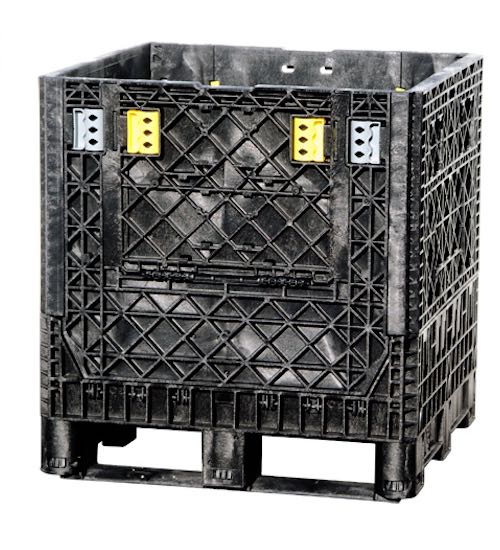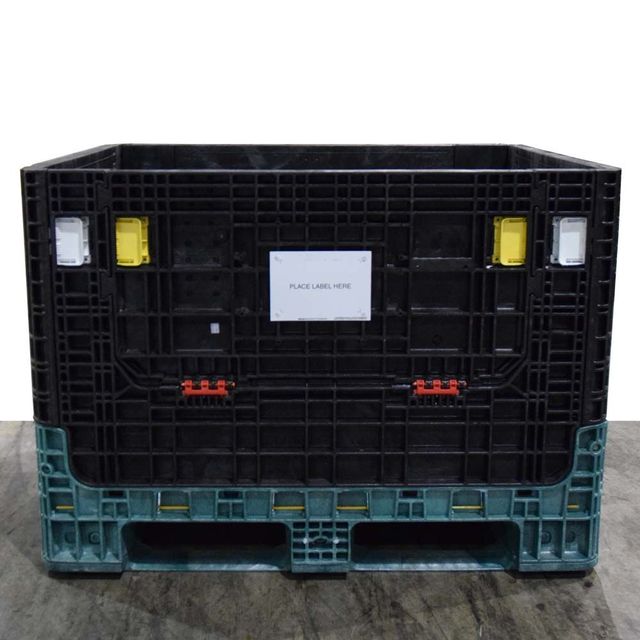Explore the versatility of used collapsible bulk containers in various industries
Wiki Article
The Ultimate Overview to Picking the Right Bulk Containers for Your Business Demands
Choosing the ideal bulk containers is important for any company that relies upon reliable logistics. Various types of containers exist, each developed for details materials and applications. Factors such as dimension, product compatibility, and governing standards play a considerable role in this decision-making procedure. Understanding these elements can cause improved operational efficiency. However, many services ignore necessary facets that can improve their total efficiency and sustainability. What are these considerations?Recognizing Various Sorts Of Mass Containers
Mass containers function as vital tools for organizations seeking efficient storage space and transportation options. These containers are available in different kinds, each made to satisfy details functional needs. One usual type is the intermediate mass container (IBC), which is perfect for granulated and fluid products, providing a balance of ability and maneuverability. Another preferred alternative is the bulk bag, or FIBC, ideal for completely dry, flowable products. These flexible containers are lightweight and can be easily carried and kept. For heavier products, stiff bulk containers are commonly utilized, offering sturdiness and security for secure handling. In addition, there are specific containers tailored for unsafe products, making certain conformity with safety and security guidelines. Comprehending the distinct characteristics of these mass container kinds permits companies to make informed decisions that enhance logistics and reduce prices. By selecting the right container, firms can enhance their operational effectiveness and simplify their supply chain procedures.Secret Product Factors To Consider for Mass Containers
When selecting mass containers, it is vital to ponder the materials made use of in their construction. Aspects such as strength, resilience, and chemical compatibility play a critical role in ensuring the containers meet details functional demands. Furthermore, weight and portability issues can influence both performance and transport logistics.Product Resilience and Toughness
Longevity and toughness are critical consider choosing materials for mass containers, as they directly influence the container's ability to hold up against different environmental problems and dealing with procedures. Products such as high-density polyethylene (HDPE), polypropylene, and stainless steel are typically preferred for their robust properties, supplying resistance to abrasion, effect, and temperature level variations. The choice of product likewise impacts the overall life-span of the container; stronger products usually cause less regular replacements, leading to set you back savings over time. Furthermore, the weight of the product can affect shipping expenses and convenience of handling. Companies have to consider their details functional atmospheres and the potential for deterioration to assure peak sturdiness and stamina in their bulk container selection.Chemical Compatibility Factors
Comprehending chemical compatibility is crucial for picking mass containers, as the materials made use of must withstand the particular substances they will certainly hold. Different elements affect compatibility, consisting of the chemical nature of the contents, temperature level, and duration of storage space. Corrosive chemicals may call for containers made from stainless steel or specialized plastics that resist deterioration. Additionally, responsive materials can produce warm or gases, requiring vented or pressure-rated containers. The choice of container material, whether polyethylene, polycarbonate, or metal, ought to straighten with the chemical residential or commercial properties of the stored substances to avoid leaks or violations. Inevitably, a detailed evaluation of these compatibility factors guarantees risk-free handling and storage, shielding both workers and the setting while keeping item honesty.Weight and Mobility Worries
Choosing bulk containers involves not only reviewing chemical compatibility however additionally taking into consideration weight and mobility. Services have to analyze the convenience of handling and transportation to optimize efficiency. Lightweight materials like high-density polyethylene (HDPE) or aluminum can facilitate less complicated motion and decrease shipping costs. Conversely, much heavier containers might offer boosted resilience however can hinder mobility, particularly in atmospheres needing regular moving. In addition, the layout of the container should permit hassle-free training and stacking, making sure ergonomic safety and security for employees. Business should also take into consideration the facilities offered for transportation; as an example, containers suitable with forklifts or pallet jacks can enhance operations. Eventually, the right equilibrium between weight and mobility directly influences functional effectiveness and price efficiency.Sizing Your Mass Containers for Optimum Performance
When sizing bulk containers, companies have to carefully evaluate the measurements required to fit their details products. In addition, weight capacity is a crucial variable that affects effectiveness and safety throughout transportation and storage. Effective sizing not just takes full advantage of area however likewise maximizes operational operations.Figuring Out Container Dimensions
Selecting the ideal measurements for bulk containers is crucial for taking full advantage of effectiveness in storage and transport. Companies must assess their specific needs, taking right into account factors such as readily available room, the nature of the products being stored, and the approaches of transport used. Exact measurements ensure that containers fit preferably in automobiles and storehouses, reducing wasted room and reducing dealing with time. Standard dimensions can provide ease, but personalized dimensions may be essential for one-of-a-kind needs or to accommodate specific items. Additionally, it is necessary to assess stacking capabilities and access, as these factors affect total functional effectiveness. Inevitably, the right dimensions lead to enhanced organization and streamlined logistics, profiting the general efficiency of business.Weight Capacity Considerations
Understanding weight capacity is essential for companies aiming to enhance their mass container effectiveness. The weight capability of a container straight influences storage space capacities, transportation logistics, and overall functional prices. Selecting containers with the ideal weight restrictions assures that services can securely store and transfer their products without taking the chance of damages or compliance issues. Overwhelming containers can cause architectural failings, while underutilizing ability lead to wasted resources. When choosing containers, it is vital for companies to evaluate their product weights and take into consideration any kind of governing requirements. Furthermore, variables such as the kind of product, meant usage, and ecological problems need to additionally affect weight ability decisions. By reviewing these components, businesses can enhance performance and ensure a structured supply chain.Regulative Conformity and Safety Specifications

Regulatory compliance and safety and security requirements play a crucial role in the selection of mass containers for organizations. Organizations must assure that their containers meet various regulations set by neighborhood, nationwide, and global authorities. These criteria usually concern material safety, structural integrity, and appropriate labeling, which help prevent accidents and assure the safe transportation of products.
In addition, adherence to industry-specific guidelines, such as those from the Food and Medication Administration (FDA) or the Occupational Safety and Health And Wellness Administration (OSHA), is important for business taking care of hazardous materials or foodstuff. Non-compliance can result in fines, lawful problems, or damages to a service's credibility.
Companies should also take into consideration the container's compatibility with the materials being kept or carried to avoid contamination or chemical reactions (used collapsible bulk containers). To summarize, recognizing and implementing regulatory conformity and safety criteria is important for the responsible and effective use of bulk containers
Sustainability Alternatives for Eco-Friendly Bulk Containers

Business are likewise checking out choices made go to website from recycled products, which not only save resources yet also support the reusing industry. Innovations in layout enable for lighter containers that require much less power to transport, better boosting sustainability. By incorporating these green mass container choices, companies can demonstrate their dedication to ecological stewardship while fulfilling customer demand for sustainable practices. This shift Learn More not only aids the earth however can additionally improve brand name reputation and client loyalty.
Cost-Effectiveness and Budgeting for Bulk Containers
While many businesses concentrate on sustainability, cost-effectiveness continues to be a vital aspect when selecting mass containers. Organizations should examine the initial acquisition rate, along with lasting functional prices, to guarantee monetary practicality. Factors such as upkeep, sturdiness, and reusability play a significant role in figuring out total costs.Purchasing high-grade containers might generate higher in advance costs however can lead to financial savings through minimized replacement rates and reduced waste. In addition, organizations should take into consideration transport expenses and storage efficiency, as these can affect the general budget plan.

Regularly Asked Inquiries
Just how Do I Identify the Right Container for Hazardous Materials?
To establish the appropriate container for harmful materials, one have to evaluate compatibility with the compound, consider the container's material, look for regulatory conformity, and analyze ability and security functions to ensure appropriate handling and storage space.Can Mass Containers Be Customized for Specific Products?
Yes, bulk containers can be personalized for details products. used plastic containers. Various attributes, such as product, size, and layout, can be tailored to satisfy distinct requirements, making certain optimal safety and efficiency for transporting and storing various goodsWhat Is the Average Life Expectancy of Different Bulk Container Kind?
The average life-span of mass container kinds varies; plastic containers last 5-10 years, steel containers 10-20 years, and wood containers normally last 3-7 years, depending on use, maintenance, and ecological problems.Exactly how Should I Tidy and Maintain Bulk Containers?
To clean and keep bulk containers, one should consistently check for damage, eliminate deposit, wash with appropriate cleaning agents, rinse completely, and warranty correct drying out prior to storage space. Following maker standards enhances long life and safety during usage.Exist Rental Choices for Bulk Containers Available?
Yes, many business provide rental visite site options for mass containers, offering versatility for services. These services can fit various needs, allowing companies to manage inventory successfully without the commitment of buying containers outright.Resilience and strength are vital variables in picking products for bulk containers, as they directly influence the container's ability to endure various environmental problems and managing procedures. Comprehending chemical compatibility is essential for picking mass containers, as the materials used must stand up to the details materials they will certainly hold. Comprehending weight capability is crucial for organizations aiming to enhance their bulk container performance. Regulatory conformity and safety and security standards play a crucial function in the option of bulk containers for services. While lots of services concentrate on sustainability, cost-effectiveness continues to be a critical element when selecting bulk containers.
Report this wiki page